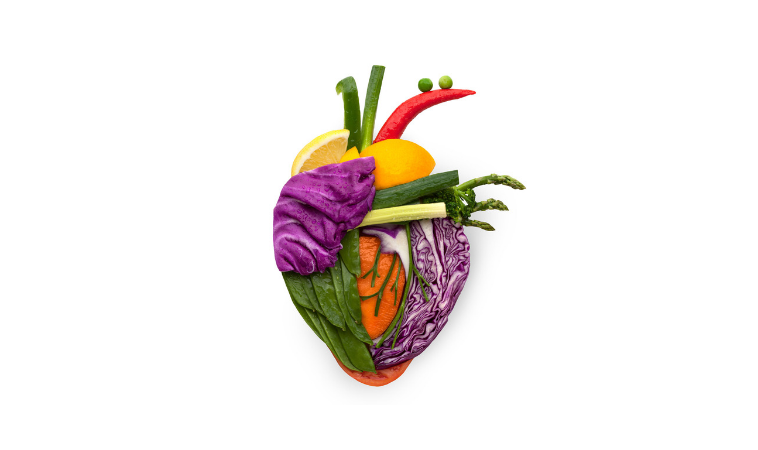Preliminary findings from a new study reveal that inadequate fruit and vegetable consumption may account for millions of deaths from heart disease and strokes each year. The study estimated that roughly 1 in 7 cardiovascular deaths could be attributed to not eating enough fruit and 1 in 12 cardiovascular deaths could be attributed to not eating enough vegetables.
Getting to the Heart of the Matter
Low fruit intake resulted in nearly 1.8 million cardiovascular deaths in 2010, while low vegetable intake resulted in 1 million deaths, according to researchers. Overall, the toll of suboptimal fruit intake was almost double that of vegetables. The impacts were most acute in countries with the lowest average intakes of fruits and vegetables.
“Fruits and vegetables are a modifiable component of diet that can impact preventable deaths globally. Our findings indicate the need for population-based efforts to increase fruit and vegetable consumption throughout the world,” said lead study author Victoria Miller, a postdoctoral researcher at the Friedman School of Nutrition Science and Policy at Tufts University.
Miller presented the research findings at Nutrition 2019, the American Society for Nutrition annual meeting, held June 8-11, 2019 in Baltimore.
Fruits and vegetables are good sources of fiber, potassium, magnesium, antioxidants and phenolics
Fruits and vegetables are good sources of fiber, potassium, magnesium, antioxidants and phenolics, which have been shown to reduce blood pressure and cholesterol. Fresh fruits and vegetables also improve the health and diversity of good bacteria in the digestive tract. People who eat more of these foods also are less likely to be overweight or obese, lowering their risk of cardiovascular disease.
“Global nutrition priorities have traditionally focused on providing sufficient calories, vitamin supplementation and reducing additives like salt and sugar. These findings indicate a need to expand the focus to increasing availability and consumption of protective foods like fruits, vegetables and legumes; a positive message with tremendous potential for improving global health,” said senior study author Dariush Mozaffarian, dean of the Friedman School of Nutrition Science and Policy at Tufts University
Optimal fruit and vegetable intake
Based on dietary guidelines and studies of cardiovascular risk factors, the researchers defined optimal fruit intake as 300 grams per day, equivalent to roughly two small apples. Optimal intake of vegetables, including legumes, was defined as 400 grams per day, equivalent to about three cups of raw carrots.
The researchers estimated average national intake of fruit and vegetables from diet surveys and food availability data representing 113 countries (about 82 percent of the world’s population), then combined this information with data on causes of death in each country and data on the cardiovascular risk associated with inadequate fruit and vegetable consumption. The work is part of the Global Dietary Database project funded by the Bill & Melinda Gates Foundation.
Suboptimal fruit and vegetable consumption can be deadly
Based on data from 2010, the scientists estimated that suboptimal fruit consumption results in nearly 1.3 million deaths from stroke and more than 520,000 deaths from coronary heart disease (narrowing of the heart’s arteries) worldwide each year. Suboptimal vegetable consumption was estimated to result in about 200,000 deaths from stroke and more than 800,000 deaths from coronary heart disease.
Impact of inadequate fruit and vegetable intake
The impact of inadequate fruit and vegetable intake was greatest in countries with the lowest fruit and vegetable consumption. Countries in South Asia, East Asia and Sub-Saharan Africa had low fruit intake and high rates of associated stroke deaths. Countries in Central Asia and Oceania had low vegetable intake and high rates of associated coronary heart disease.
In the United States, suboptimal vegetable intake may account for 82,000 cardiovascular deaths while suboptimal fruit intake accounted for 57,000 deaths. Cardiovascular disease is the number one cause of death in the United States and worldwide.
Suboptimal fruit and vegetable intake affected these groups the most
By age group, suboptimal fruit and vegetable intake had the greatest perceived proportional impact on cardiovascular disease deaths among younger adults. By gender, suboptimal fruit and vegetable intake had the greatest proportional impact on cardiovascular disease deaths in men, likely because women tend to eat more fruits and vegetables, Miller noted.
 Razi Berry is the founder and publisher of the journal Naturopathic Doctor News & Review, which has been in print since 2005, and the premier consumer-faced website of naturopathic medicine, NaturalPath. She is the host of The Natural Cancer Prevention Summit and The Heart Revolution-Heal, Empower and Follow Your Heart, and the popular 10 week Sugar Free Summer program. From a near death experience as a young girl that healed her failing heart, to later overcoming infertility and Chronic Fatigue Syndrome and Fibromyalgia through naturopathic medicine, Razi has lived the mind/body healing paradigm. Her projects uniquely capture the tradition and philosophy of naturopathy: The healing power of nature, the vital life force in every living thing and the undeniable role that science and mind/body medicine have in creating health and overcoming dis-ease. Follow Razi on Facebook at Razi Berry and join us at Love is Medicine to explore the convergence of love and health.
Razi Berry is the founder and publisher of the journal Naturopathic Doctor News & Review, which has been in print since 2005, and the premier consumer-faced website of naturopathic medicine, NaturalPath. She is the host of The Natural Cancer Prevention Summit and The Heart Revolution-Heal, Empower and Follow Your Heart, and the popular 10 week Sugar Free Summer program. From a near death experience as a young girl that healed her failing heart, to later overcoming infertility and Chronic Fatigue Syndrome and Fibromyalgia through naturopathic medicine, Razi has lived the mind/body healing paradigm. Her projects uniquely capture the tradition and philosophy of naturopathy: The healing power of nature, the vital life force in every living thing and the undeniable role that science and mind/body medicine have in creating health and overcoming dis-ease. Follow Razi on Facebook at Razi Berry and join us at Love is Medicine to explore the convergence of love and health.

















